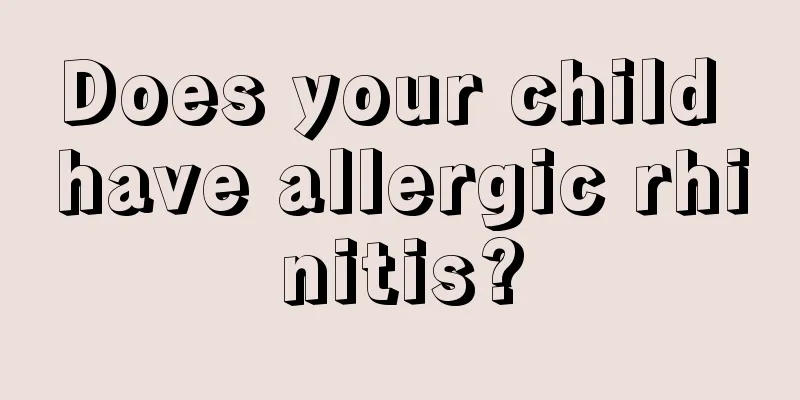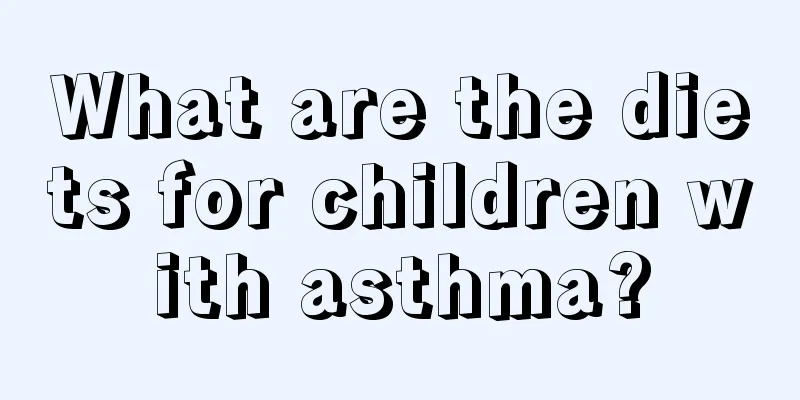What are the expectorants for children?

|
Coughing with a lot of phlegm is a problem of the respiratory system. Phlegm is produced because the respiratory mucosa is irritated. Children will cough constantly during a cold because it is inconvenient to spit. Parents should pay attention to this situation. First of all, when giving children medicine, they should not use it casually. They should use it according to the child's age and physical condition.
Phlegm is a product of respiratory inflammation, which can irritate the respiratory mucosa and cause coughing, and may aggravate the infection. Expectorants can thin phlegm or liquefy sticky phlegm to make it easier to cough up. illustrate Expectorants can be divided into three categories according to their mode of action: ① Nausea and irritation expectorants: such as ammonium chloride and guaifenesin, which are nausea expectorants. After oral administration, they can irritate the gastric mucosa, causing mild nausea, and reflexively promote the increase in secretion of respiratory glands, thereby diluting sticky sputum and making it easier to cough up; irritant expectorants are some volatile substances, such as eucalyptus oil and tincture of benzoin, which are added to boiling water. The evaporation of their vapor can also irritate the respiratory mucosa, increase secretion, and dilute sputum to make it easier to cough up; ② Sputum dissolving agents: such as acetylcysteine, which can decompose the viscous components in sputum, liquefy sputum, reduce viscosity and make it easier to cough up; ③ Mucus regulators: such as bromhexine hydrochloride and carbocysteine, which act on the mucus-producing cells of the trachea and bronchi, reduce the viscosity of secretions, and make sputum thinner and easier to cough up. Common medicines Ammonium chloride [Drug name] Ammonium chloride [Other names] Erbium chloride [Indications] Oral administration of this product causes chemical stimulation to the gastric mucosa, reflexively increases the secretion of respiratory glands through the vagus nerve, and makes sticky phlegm thinner and easier to cough up. Suitable for people with dry cough and sticky phlegm that is difficult to cough up. [Indications for caution] Use with caution in patients with renal insufficiency to prevent hyperchloremic acidosis. [Contraindications] Contraindicated in patients with liver dysfunction. [Drug Interactions] This product is incompatible with chlortetracycline, neomycin, nitrofurantoin, sulfadiazine, and warfarin. [Dosage form] Tablet: 0.3 g; Solution: 10% [Usage and Dosage] Oral administration. 0.3~0.6g/time, 3 times/day. [Observation on medication]Adverse reactions: Oral administration may cause gastrointestinal reactions such as nausea and vomiting. Precautions: Overdose can cause hyperchloremic acidosis, hypokalemia and hyponatremia. [Drug name] Glyceryl Guaicolate [Other names] Guaifenesin, guaiacol glycerol ether, guaiacol glycerol [Indications] After oral administration, this product can stimulate the gastric mucosa, reflexively cause increased bronchial secretion, reduce the viscosity of sputum, and has a strong expectorant effect. Used for bronchitis, chronic suppurative tracheitis, lung abscess, bronchiectasis, etc. It is often used together with antitussive or antiasthmatic drugs to enhance the antitussive or antiasthmatic effects.[Contraindications] It is contraindicated for patients with acute gastroenteritis, pulmonary hemorrhage, and nephritis. 〖Dosage form〗Syrup. Each 100ml contains 1g of guaifenesin, 0.1g of carbetapentane, 20mg of chlorpheniramine and 10mg of menthol. [Usage and Dosage] Oral, 3 to 4 times a day. Adults, 5-10 ml each time; children, 0.5-1 ml/time, 3-4 times a day. [Observation during use] Nausea and gastrointestinal discomfort may occur occasionally. |
<<: What to do if a little girl has inverted nipples
>>: What is the best way to treat eczema in children?
Recommend
Children's hands and feet are cold and their bodies are hot
I believe everyone has experienced the feeling of...
Rehabilitation training for children with hemiplegia
Hemiplegia itself is a terrible thing. If there i...
Reasons for baby's stuffy nose, cough and phlegm
When a baby is sick it is a headache for many par...
If parents are short, can children grow taller?
Generally speaking, if parents are short, they wi...
What to eat for children with iron deficiency anemia
Iron deficiency anemia is also a type of anemia. ...
Three major symptoms of autism in children
The psychological development of children is very...
What should I do if my baby has a runny nose and sweats? These methods are very useful
When a baby has a runny nose, it is likely a symp...
What should I do if my child has white bubbles on his tongue?
During childhood, children's body functions a...
What to do if your newborn has a thick tongue coating
Now many parents have reported that their babies’...
How should the bib be disinfected?
The issue of children has always been a concern f...
How to hold a newborn baby
After the baby is born, many parents and friends ...
What medicine should children take for gastrointestinal cold
Gastrointestinal cold in children is a type of pe...
Children's upper eyelids are red and swollen
No parents want their children to have health pro...
Is it normal for children to lose their hair?
It is not normal for children to lose hair freque...
How to treat oral cysts in children
Oral cysts in children are oral mucous gland cyst...









